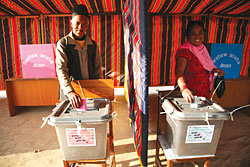 MIN RATNA BAJRACHARYA |
At a time when there is growing public disenchantment with Nepal's political process and with the lordly behaviour of elected representatives who repeatedly fail to stick to the priority of drafting a national constitution by an agreed-upon deadline, what purpose does it serve to keep on expanding the cabinet as if there were a mandate to create an unlimited government?
The answers are found in two parts. First, it's instructive to look at the governance of the political process in Nepal; and, second, on ways to fix it.
Unaccountable governance: The UK press has recently been dominated by revelations of how many of the 646 Members of Parliament have abused public funds to pay for personal indulgences that ranged from cleaning up a privately-owned moat to buying fertilizers to paying for flats for their children. The revelations sent a shock wave through the British political system, leading to both the ridicule and resignations of guilty politicians. Those who have retained their jobs have had to continue to govern with a tarnished reputation and diminished stature.
Though Nepal follows a British-style Westminster model of parliamentary democracy, the gulf between the public and those who are elected to serve the public remains immense in this country. This is partly because intermediary institutions that check the expanding power of the government are either weak or do not exist. As such, it often looks as if our politics is comprised of two spheres ? the first one containing the 601 representatives, and the second one containing the voting population ? with the first having little connection to the second once elections are over.
For illustration, consider this example: Khyati Shrestha, a high school student from Biratnagar was found brutally murdered in Kathmandu a few days ago. Hers was not the only murder that has taken place in recent times. Given the alarming rise in the number of children who have been kidnapped and then murdered, you'd think that our representatives would put pressure on the Home Minister to uphold law and order. You would also think that they'd like to signal they are doing all they can to allay their voters' palpable fears.
But no!
In this case, several days after the murder, politicians of all stripes, elected from Biratnagar or elsewhere, have made absolutely no noise in support of the Shrestha family. The family is left to fend for itself to push for justice.
This sort of silence from those elected to represent our interests has happened in many other cases. A bridge breaks down near a temple, like one did last year. Hundreds of pilgrims are killed. Not a word comes from any member of Parliament. Similarly, press reports of food shortages in the hills of Western Nepal. Again, not a word of support, let alone actions that help deliver the grains, from the politicians elected from that region. When these examples add up, you start to wonder: when your representatives do not speak up for you who are affected in times of crisis, what is the point of going through the motion of elections?
True, holding free and fair elections on a regular basis is one feature of democracy. And on this account, few fault Nepal's present democratic regime. Despite reports of Maoist intimidation at some polling stations in the hinterland, most accept that present representatives were elected in what were generally considered to be free and fair elections last year.
But problems become clearer when we examine the mechanics of how parties have subverted the election process so it is not responsive to the public's concerns. Here is how it works: parties decide who they want to send as candidates to a district. Party cadres fight with one another to curry favours from their leaders to receive the election ticket. Those who receive the election tickets need neither be residents nor have any stake in the district's affairs.
Herein is the crux of the problem. When all parties, taking cue from one another, field candidates in this manner, voters have no choice but to elect pretty much one stranger over another. When a stranger thus gets to parliament, on the back of the support of voters he barely knew a month before, is it any wonder that he has little to gain by voicing the concerns of those voters, and much to gain by making his leaders happy, lest they not give him the ticket in the next round of elections?
When you have a parliament full of democratically elected representatives who have every incentive to toe the party line, it's only a matter of time before horse-trading starts, before the cabinet is expanded to accommodate every disgruntled party, and before commissions are formed to provide jobs to hangers-on. All these leave the voters to recede from the political memory for several years, reduced as they are to being mere spectators.
Fixing it Those who complain about the inaction of our large-size government should stop expecting saintly politicians as outputs. They should instead focus on the inputs. That is to say, the one way to make the representatives accountable to the public, so that they and their parties do not keep on expanding the size of the government, is by first correcting how the candidates are fielded to the public during elections. The more tangible connection a candidate has to a district, the more likely he is to listen to the voters' concerns. This simple change in the initial conditions is also more likely to connect national parties with influential local politicians who, in many cases, would not have to either run as independents or cobble together their own parties.
In the absence of such reforms that help tie representatives' actions to voters' concerns, we have no choice but to watch the Prime Minister preside over a ballooning cabinet in the name of letting almost all parties be in the government.



